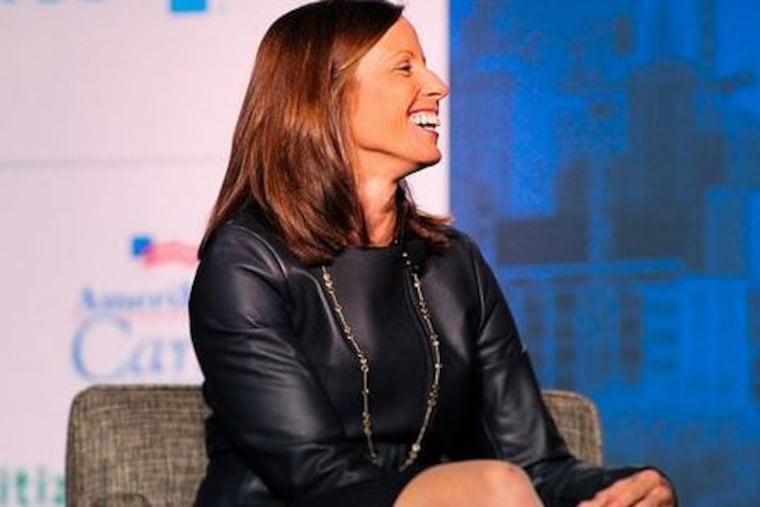Nasdaq chief calls Philly a fertile place for tech to grow
Her mom called her "too Type A" to stay home; her dad "raised her on a trading floor"

Nasdaq Inc., the world's second-largest stock market group after the New York Stock Exchange, is hiring in Philadelphia and will continue to expand its options-trading and technology-services groups based here, says Adena Testa Friedman, the company's chief executive.
Nasdaq, which had $8 trillion in global trades last year, has added 80 jobs since moving to three high floors of the FMC Tower at 2929 Walnut St. last spring from the old Philadelphia Stock Exchange building at 1900 Market St. The new site now employs 230, plus scores of options traders at independent and national firms, Friedman told a sellout crowd of 1,600 at the Chamber of Commerce of Greater Philadelphia's yearly breakfast conclave. The event also marked Independence Health Group boss Daniel Hilferty's takeover of the chairman's gavel from Drexel University chief John Fry, architect of the city's Amazon "HQ2" bid.
Hilferty and chamber executive director Rob Wonderling cited Nasdaq as an example of a big national tech and finance employer that sees Philadelphia as a cost-effective place to do business, though it's a relatively small employer compared to the vanished billion-dollar banks and insurers that made the city a financial center, before the mergers of the late 20th century.
Friedman was introduced by Gerry Fasano, the Villanova grad who heads the defense group at Leidos, the Reston, Va., military contractor that includes former Lockheed Martin businesses in South Jersey. Leidos has sponsored the last couple of chamber annual meetings, helping raise its regional profile.
For the crowd, Friedman fielded friendly questions from Amy Gutmann, president of the University of Pennsylvania, the region's largest employer with more than 30,000 workers. After Gutmann noted Friedman's role as "one of the most powerful women" in business on Forbes Magazine's list and "the first woman to lead a major global exchange," Friedman described her rise as incremental: She joined Nasdaq straight out of Williams College and worked her way up the ranks, with a stint as chief financial officer at buyout giant Carlyle Group. She has been Nasdaq's chief executive since early last year.
When Friedman and her husband, a college classmate, started a family, Friedman's lawyer mom, who had packed a young Adena along to law school classes, warned her against being a stay-at-home mom: "You're too Type A." Her father, managing director at T. Rowe Price, "raised her on a trading floor," as Gutmann put it.
Gutmann cited Friedman as a key figure in Nasdaq's 2008 acquisition of the Philadelphia Stock Exchange, the nation's oldest. Unlike other regional markets, the PHLX had a robust technology group, which helped persuade Nasdaq to enlarge the PHLX options business, already one of the nation's busiest. By contrast, most U.S. exchanges have consolidated and closed as traders took advantage of improved communications to work from remote locations.
"We committed to maintain the trading floor so long as it was a positive contributor to the business, which it has continued to be," Friedman said. "The people who run our trading businesses, our options business, our trading floor," include Philadelphia residents. Employees have flourished at the FMC Tower, "where they finally have windows" facing the sun, unlike the dark Market Street floor with its banks of computer boxes. "And we've been bringing our talent into the Philadelphia area, too."
Friedman compared financial technology to digital automation trends in health care, Philadelphia's most notable industry. Both are investing in data management and security upgrades. And innovative technologies "are crossing over" between the sectors, Friedman affirmed. Players in both sectors are trying " to create more efficient marketplaces" with encrypted platforms launched from remote servers. At its core, Nasdaq "is a technology company that happens to work in the financial services industry."
Picking up on Hilferty's call for Philadelphians to "build bridges" among the region's distinct and often very separate communities, Friedman said she has found that "diversity results in better outcomes for companies and consumers." Big corporations are doing a better job hiring women and minorities, she added, but need to promote more of them to management.
And she gave a shout-out to Gutmann's profession, maintaining that tech company jobs "start with higher education. We are making a very concerted effort to grow in cities" with a lot of colleges. The city is convenient to Nasdaq's New York base, she added: "We want to grow in Philadelphia, and on the Acela, it's super-easy to get there."